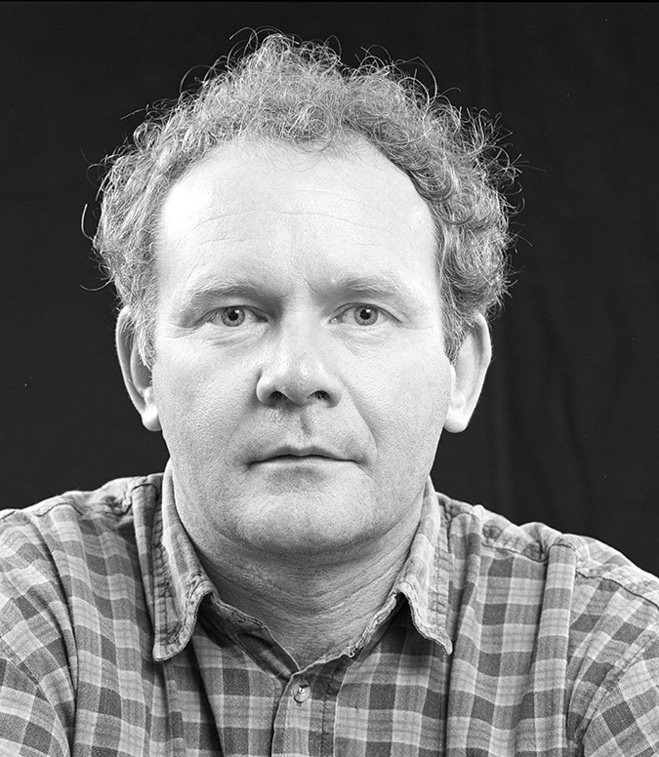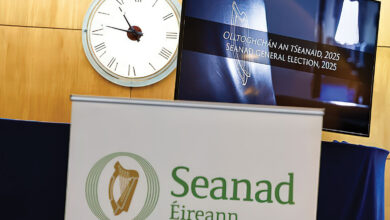Martin McGuinness 1950 – 2016


After a decade of service as deputy First Minister, Martin McGuinness retired from political life and was succeeded as leader of Sinn Féin’s Stormont contingent by Michelle O’Neill. Shortly after, on 21 March 2017, he succumbed to a short illness. eolas reports from the Derry funeral.
From early morning, thousands of mourners began lining the streets of the Bogside, conspicuously located outside the old city boundaries and overlooked by its historic stone battlements. For the assembled press, Derry’s ramparts, once home to an imposing British Army watchtower, offered an unrivalled vantage point from which to observe the proceedings taking place below. Upon removal from the family home, the coffin was adorned with the national flag while independent Seanadóir Frances Black recited Patrick Kavanagh’s Raglan Road.
As the remains of Martin McGuinness made their way down the hill of Westland Street and looped around Free Derry Corner towards St Columba’s Church, black clad supporters, many sporting pinned Easter lilies, broke into spontaneous applause. A piper led the procession throughout the short journey which, while scarcely a kilometre in distance, took almost an hour to complete. The faces of Sinn Féin TDs, MLAs and MPs were speckled unobtrusively amongst the throngs of neighbours, colleagues, comrades and supporters. With pained expressions, the party leadership assisted the McGuinness family in lifting the coffin.
Dozens of notable personalities from across the political spectrum and civil society assembled inside the chapel too. Uachtarán na hÉireann Michael D. Higgins and his predecessor Mary McAleese, three Taoisigh, party leaders from across the islands, current and former First Ministers, former SNP leader Alex Salmond, GAA President Aogán Ó Fearghaíl, the FAI’s John Delaney and international representatives from Palestine, Cuba and South Africa were among those who attended. Acknowledging her difficult decision, mourners greeted DUP leader Arlene Foster’s presence with warm applause.
Whilst the Requiem Mass was presided over by Bishop Donal McKeown, Bishop of Derry and led by Father Michael Canny as chief celebrant, two prominent Protestant Derry clergymen, the reverends Harold Good and David Latimer also provided homilies. Delivering a humorous eulogy, former US President Bill Clinton stated: “[Martin McGuinness] never stopped being who he was; a good husband, a good father, a faithful follower of the faith of his father and mother, and a passionate believer in a free, secure, self-governing Ireland. The only thing that happened was: he expanded the definition of ‘us’ and shrank the definition of ‘them’.”
Following Mass, the cortege snaked its way back through the Bogside for a final time, to the hillside republican plot in the City Cemetery which looks out across McGuinness’ native place. The role of graveside oration fell to Sinn Féin President Gerry Adams, McGuinness’ lifelong political companion. Invoking the spirit of O’Donovan Rossa’s funeral, great applause was drawn when he passionately proclaimed: “Martin McGuinness was not a terrorist. Martin McGuinness was a Freedom Fighter.”
This was tempered with an appeal to nationalists and republicans: “Do nothing to disrespect our unionist neighbours or anyone else. Stand against bigotry. Against sectarianism. But respect our unionist neighbours. Reach out to them. Lead, as Martin led, by example.”
Rejecting the depictions of McGuinness as unidimensional or as having underwent “a road to Damascus conversion”, Adams asserted: “To suggest this is to miss the truth of his leadership and the essence of his humanity. There was not a bad Martin McGuinness or a good Martin McGuinness. There was simply a man, like every other decent man or woman, doing his best. Martin believed in freedom and equality.”
The journey concluded with an emotional rendition of Amhrán na bhFiann and a tribute from Christy Moore who sang The Time Has Come.
Martin McGuinness is survived by his wife Bernie and their children Gráinne, Fionnuala, Fiachra and Emmet.
Ar dheis Dé go raibh a anam.





